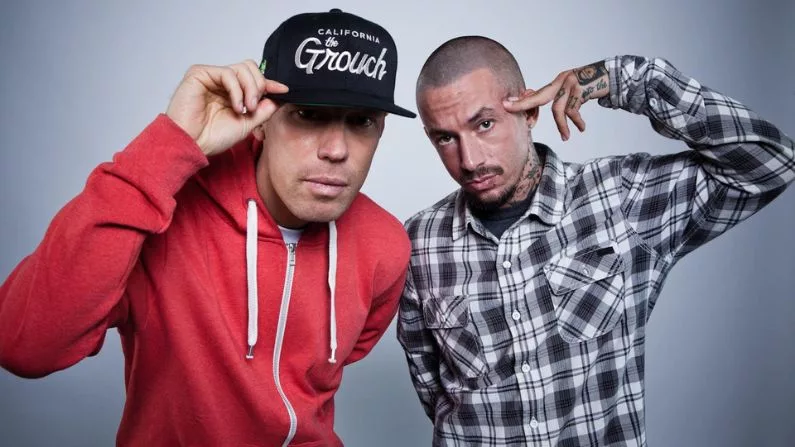Longtime rappers and producers The Grouch and Eligh have been blessing crowds with their truthfully poignant raps, commanding stage presence, and neck-snapping beats for almost 30 years.
They’ve released over 20 projects within their respective careers as solo acts, a successful duo and as part of the hip-hop supergroup they co-founded, Living Legends.
In advance of their show on Sunday, Feb. 19th, at the Mangy Moose in Teton Village with support from Amp Live, Reverie and KHOL Music Director KnewJack, The Grouch and Eligh joined us for a phone conversation.
The following interview transcript has been edited for clarity and brevity. This conversation was recorded on Tuesday, Feb. 14.
JACK CATLIN/KHOL: You both have really unique flows, with Grouch’s being more deliberate and Eligh’s more fast paced. Which rappers had the most influence on your individual styles and how did you develop those as you were going along?
ELIGH: This is an easy one for me. There’s three. But they’re different eras. Like the first one to really have an effect on me would be Wise Intelligent of Poor Righteous Teachers. Most people, even of our age range, some people don’t even know of Poor Righteous Teachers or Wise Intelligent because they weren’t huge[ly] mainstream. They had like a song or two. But his style is the first rapper where I was like, “Oh, I want to rap like that.” And he was very choppy. Dancehall style. He was very melodic. And then after that, the next incarnation was Freestyle Fellowship, of course, who I always talk about and Mykah 9 being the guy in the group that blew my little 13-year-old mind. I didn’t know anybody could rap like that. I heard that and I wanted to do that. I just wanted to do that.
And then right after that, Andre 3000 of Outkast. Grouch and I both love that guy to death and still love him to that. I mean, I still love all of these guys as far as what kind of skill levels they have. Mykah 9 could get on stage to this day and do the songs from when I was a kid and murder it the same way, now! To me, he’s a God rapper. You know those guys where you can aspire to be like some of these dudes, but you’ll never be able to do what they do because something about them is just in a different place.
THE GROUCH: For me, coming from Oakland, Too $hort was one of the greatest influences. And also I obviously don’t have the same kind of content as him, but as far as keeping it simple and keeping the rap straight forward, you know, he doesn’t double time rap. I think I got a lot of influence from him there. Also, Del the Funky Homosapien. Sometimes I listen back to some of my earlier stuff and I’m like, “Wow, was biting that guy”. Even my mom one time said, we’re listening to Del’s songs and she’s like, “That sounds like you!” As if he was copying me and I’m like “No mom, I sound like him.” But not so much. I eventually developed my own style, I think. But I will say that stylistically, maybe those two guys and I want to speak on like concepts and content. KRS One, A Tribe Called Quest, De La Soul. You know, Rakim, knowledge in raps like when being smart was being cool, Wise Intelligent, all those guys, street smart, N.W.A. You know, a combination of all of that.
ELIGH: That’s a good distinction he made, though, because there’s style and then there’s content and I know I went through different phases. When I was really young, it was all style. It was all, “What kind of words can I throw in here that just nobody’s using?” And some of it, if I go back and listen to Log Cabin stuff, which was my pre, you know, meeting the Living Legends crew guys, you know, Murs, Scarub and me in high school and rapping crazy. Like just how fast can I rap and how many words can say. I’m like, that doesn’t make sense. But it didn’t matter. It was style. And then I go to this next stage where I’m in Grouch’s basement making “As They Pass” and I’m actually writing about what I’m going through then. So all my songs are about being broke, being hungry, “Where are the bidis?” “I need some weed,” thinking about aliens coming, all these things that were very personal to that time and that energy stayed with me all the way till now. It was the beginning of just, “What am I going through?” You know, the vulnerability thing, which I think creates a long lasting career. Just being vulnerable and coming and talking about what you’re going through, for sure.
KHOL: Your beats and rhymes have a lot of weight, introspection and emotion wrapped up in them. Provoking thought and living a full life seemed to be the goal and message throughout your career. Can you guys speak on that?
ELIGH: It’s an extension of what I said earlier, like how it started off just trying to style better than other people. And then eventually I just started talking about what I was going through. And as we developed as people, I think, you know, spiritually and everything, every thought, process and emotion that’s going on, it’s inevitable. It’s going to come out in the music, especially when he and I get together. It kind of always just happens. We have to like purposely veer away from that. Otherwise, we’ll do a whole emo, kind of like deeper feelings based spiritual album.
I think that’s the go to for me is just to go inward and write journal-like music. And some of our best songs are those journal like songs where I listen to his verses and I’m like, “God this verse is good!’ and it’s still that way even after this long. It’ll literally be, “Here’s a page from my journal recorded over a beat.” To me, it’s still kind of the best form of music. Like you said, it sticks with people. People can identify with the feelings and stuff, that has certainly a better impact than, you know, the party songs or songs where you really are keeping it surface. You know what I mean? So I just think that’s kind of a default for when we write together, especially when it’s been a while. Like we get together and start writing, it’s usually going to start with some dumping, like, “Okay, what have we been going through? BLAAAHHHHH!” And then go from there.
THE GROUCH: Sometimes I look at my lyrics and I’m just like “I probably said, ‘I’ more than any rapper in the history of the world, I think. I feel. I love. I hate.” I don’t really tell fictional stories. It’s just always my experience. Because when I came into this, I had asked myself, What’s my content going to be? I’m not on the streets, I’m not selling dope, I’m not banging a bunch of chicks. I’m just going to talk about what I do do, you know? And so it developed from that.
I’ve just always tried to be honest about that, and that’s the most forever giving source that I have. When we started, something had us gravitate towards this crew, Living Legends, Mystik Journeymen being the originators, and we went along this path of independent music doing it ourselves. And so a lot of the content came from that experience. Being independent in 1995 was not normal. It was going against the grain. Being independent today is normal. And so a lot of our theme has been, “Believe in yourself, do what you love to do. You can do it. You know, If you build it, they will come.” I also believe that if you do something over and over again, you will be successful at it. I think that has been in our messages over the years a lot. And, you know, I know a few people who have been inspired by us and been inspired to do their own things, open up their own businesses, be rappers as well, start clothing lines. And I’m proud of whatever little part in that we may have played.
ELIGH: Somebody said this to me: “When people trailblaze, they don’t usually know what they’re doing. They’re just doing them.” They’re doing a thing, and they look back and they say, “Damn dude, we did something that was special and that inspired a lot of people, even people that we don’t even know that we inspired.” And sometimes if you think about a trailblazer of any kind, you’re like they should be living that life on the mountaintop and in a beautiful house and just sitting pretty, but a lot of trailblazers are not. They don’t have all of the glitter and glamor and, you know that peaceful life without having to worry about money. Some trailblazers never get the accolades, never get the trophies, the acknowledgment, all that.
And part of that makes me feel like I like “Ohhhhh,” and it’s not a ego thing. I’m not going to sit here and say, we created this whole thing, but I think we did something real special that continues to inspire people. And that in itself, the value of that is priceless. And that’s because music is going to go forever, far beyond when we’re here and gone. I just say that to say that what we did back then, I had no conscious thought, like “we’re doing something right now.” I was just in it and I know it felt special to go to Japan for the first time, go to Australia for the first time, Europe. But it was also like a whirlwind ride. You know, I definitely was not thinking, “Damn, we are paving the way. We are trailblazing this whole do it yourself, “You don’t need to wait for anybody to do your thing attitude.” But now looking back, of course now I see it all.
Listen above for KHOL’s full conversation with The Grouch and Eligh.






